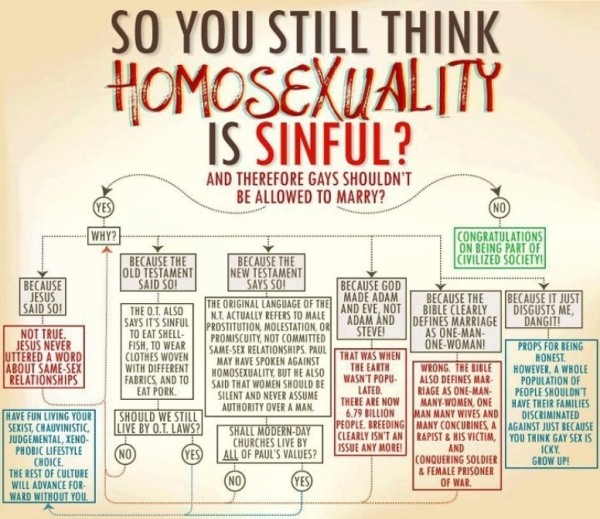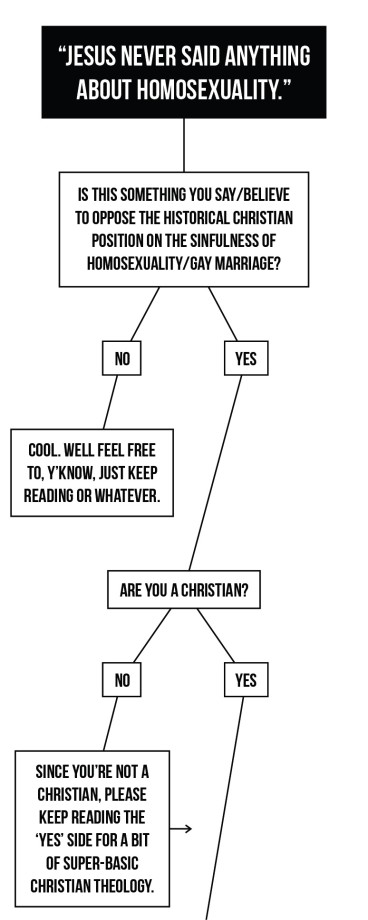Does the Bible Support Same-Sex Marriage?
by Joe Heschmeyer
Filed under Sexuality, The Bible
A lot of people online are sharing flow charts that are supposed to show the ridiculousness of opposition to gay marriage. For example (click here to expand):
There are several variations of this theme, almost all of which say the same three things: (1) Leviticus forbids homosexuality, but it also bans a bunch of other stuff, and nobody [a.k.a., no Gentile] actually lives by all those rules; (2) Paul seems to forbid homosexuality, but actually means something like temple prostitution; and (3) Jesus doesn’t mention homosexuality. Let’s look at each in turn:
What Does Leviticus Really Say?
Like every other flowchart I’ve seen on this question, the one above conflates three things found in the Book of Leviticus: (1) expressions of the moral law (like the Ten Commandments, or the prohibition against homosexuality and other forms of sexual immorality); (2) temporal punishments; and (3) the so-called ceremonial law (like the laws on keeping kosher).
The moral law, as an expression of what is good and evil, is timeless. Good doesn’t suddenly become evil, or vice versa, because it’s Tuesday, instead of Monday, or because it’s 2015 A.D. and not 2015 B.C.
But the particular statutory punishments *weren’t* timeless: they were quite explicitly the law books of the nation of Israel. These laws can be illuminating, in that they show the severity of certain sins, but the Church never considered Israel’s statutory punishments to be binding on Christians. And the ceremonial laws were a way of setting apart the Jewish people to signal them as chosen and to prepare them for Christ.
This was literally the first major dispute within the Church: the so-called Judaizers tried to enforce the ceremonial provisions of the Law on new converts, and the Church corrected them. Acts 10 is clear that the food laws aren’t still binding on Christians, and Acts 15 distinguishes between which of the Levitical precepts in ch. 17-18 are still binding on the Christians of the first century (and even these restrictions were later loosened).
So the early Christians clearly grasped that adultery was wrong but eating shellfish wasn’t. It’s remarkable that Christianity’s critics don’t realize this. I suspect that this is because the critics of traditional Christianity assume that we’re (a) all believers in sola Scriptura, and (b) senseless, so they seem to be genuinely ignorant that we might actually have an intelligent interpretive hermeneutic for knowing which parts of the Old Covenant are still applicable to the New Covenant.
What Did Paul Really Say?
The idea that Paul doesn’t really condemn homosexual behavior is based on a selective interpretative of two Greek words that he uses in 1 Corinthians 6:9: pornos (πόρνος) and malakos (μαλακός).
- a man who prostitutes his body to another’s lust for hire
- a male prostitute
- a man who indulges in unlawful sexual intercourse, a fornicator
- soft, soft to the touch
- metaph. in a bad sense
- effeminate
- of a catamite
- of a boy kept for homosexual relations with a man
- of a male who submits his body to unnatural lewdness
- of a male prostitute
- effeminate
So the Greek terms used in Paul’s day weren’t specific to only adult male-male sexual behavior (since a great deal of it was man-boy), but they certainly included those behaviors. But besides this, Paul and several other parts of the New (and Old) Testament condemn fornication. That’s broader still, but it shows that non-marital sex is sinful… regardless of who the parties are. (This raises the question: what sort of sexual unions are marriage-material? We’ll get to that shortly).
Because he rejects homosexual sex, the chart up top angrily writes St. Paul off as a judgmental xenophobe and chauvinist. This is baseless name-calling. Paul is the Apostle to the Gentiles, and he brought people from all sorts of nationalities and religious backgrounds into the Church, and fought hard to prevent them from being discriminated against or treated as second-class Christians. Xenophobe? This is the same man who wrote, “There is neither Jew nor Greek, there is neither slave nor free, there is neither male nor female; for you are all one in Christ Jesus” (Galatians 3:28).
But at least the chart is honest enough to admit that if you actually believe Leviticus and/or the writings of St. Paul, you’re not going to end up favoring same-sex marriage. So instead, they’re just going to mock faithful Jews and Christians as xenophobes and sexists… and then call us judgmental.
What Did Jesus Really Say?
There are two important points here. First, trying to pit Jesus against the Bible is a losing game. Since the people who make this argument like flow charts, I’ll lead with one from Adam4d:
But there’s a second problem with this claim. It assumes that the Bible is essentially a rule book full of Thou Shalt Not’s. That misses that both Jesus and St. Paul present a positive view of marriage. That is, Scripture shows us what marriage is, which is why we can also say what it isn’t.
This is important, because as we saw from the attempts to work around St. Paul’s prohibitions, the same-sex marriage side is essentially arguing: “but here’s an arrangement nobody had thought of back then!” With a positive view of what marriage is, we can easily establish whether some new sexual variation is compatible with marriage or not.
As part of a good Facebook thread on this topic, my friend Peter Ascik (a seminarian for the Diocese of Charlotte) explains:
Jesus does indeed comment directly on the nature of marriage in Matthew 19, and he reaffirms that marriage is founded on the sexual difference of man and woman (Matt 19:4-5), which is itself grounded in God’s creation of humanity in his image (Gen 1:27; Gen 2:24). St. Paul reaffirms the foundation of marriage in the doctrine of creation, again grounding it in the sexual difference of man and woman, (Ephesians 5:31-32), and teaches that it is a symbol of Christ’s union with the Church.
Jesus and St. Paul explicitly teach a doctrine of marriage that is incompatible with gay marriage. Even if Leviticus and Romans were silent on the subject of homosexual acts, the New Testament teaching that marriage is founded in the creation of male and female would be enough to reject same-sex marriage.
And Princeton’s Prof. Robert George chimed in to point out that this witness to marriage doesn’t start in the New Testament, and isn’t confined to Christianity:
The Biblical witness to marriage as a conjugal relationship first appears in Genesis 2. It is restated in various places, including in the teaching of Jesus. The same basic idea appears in the thought of Greek and Roman thinkers and even some teachers from the Eastern traditions. What, in fact, makes no sense is the idea of non-conjugal marriage–marriage as mere sexual-romantic companionship or domestic partnership. That explains why it has no patronage in the great faiths or traditions of philosophy.
George’s contribution is also important because it’s a reminder that even though you can’t be an orthodox Christian or Jew and accept gay marriage, you can reject gay marriage for entirely non-religious reasons. All you have to do is understand what marriage is, or understand that men and women are different, and that children deserve a mother and a father. Believing in Scripture will get you to that point, but you can get there apart from Scripture (or faith) as well.
So the gay marriage view that’s supposed to show that we’re a bunch of Biblical hypocrites more accurately shows that the best argument against Jews, Christians, and anyone holding to any of the great philosophical traditions, is just to shout us down, call us nasty names and, where necessary, to use simplistic and deceptive flow charts.
Related Posts
Note: Our goal is to cultivate serious and respectful dialogue. While it's OK to disagree—even encouraged!—any snarky, offensive, or off-topic comments will be deleted. Before commenting please read the Commenting Rules and Tips. If you're having trouble commenting, read the Commenting Instructions.















